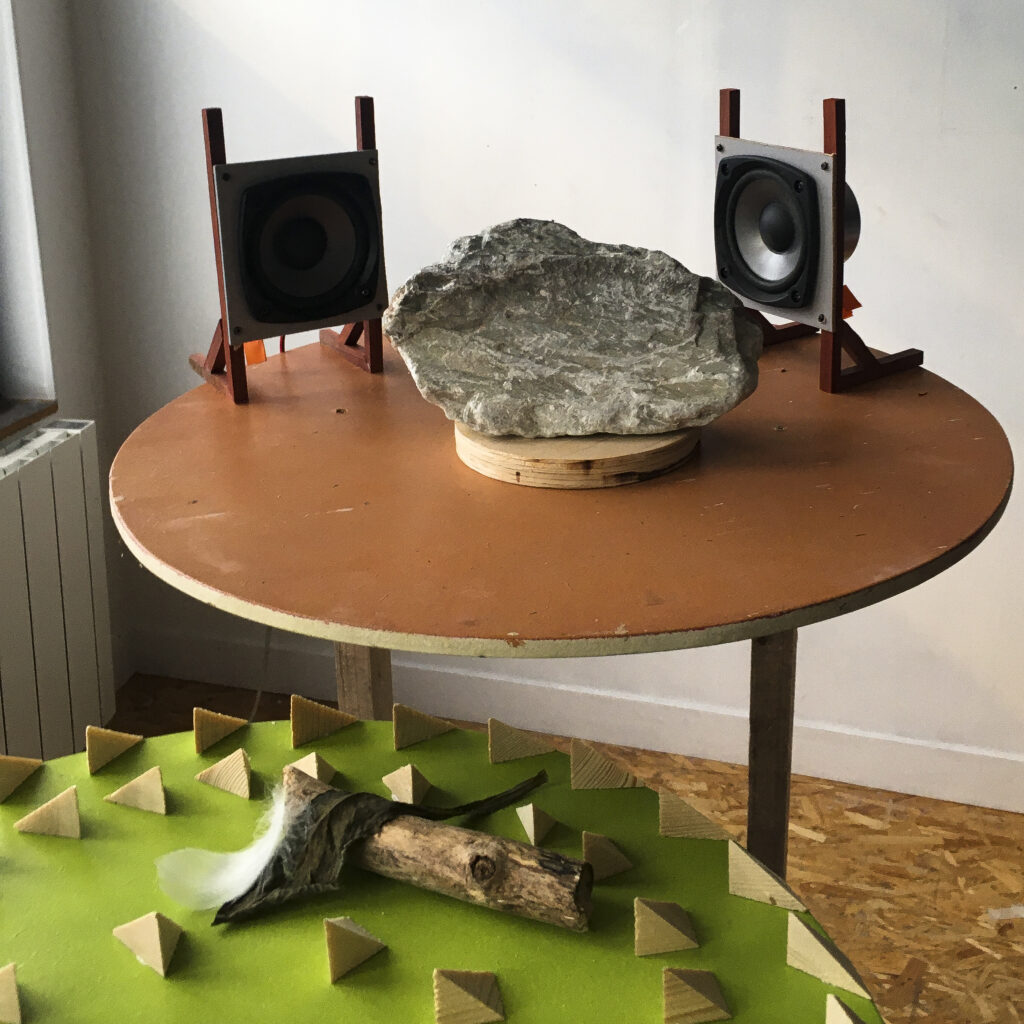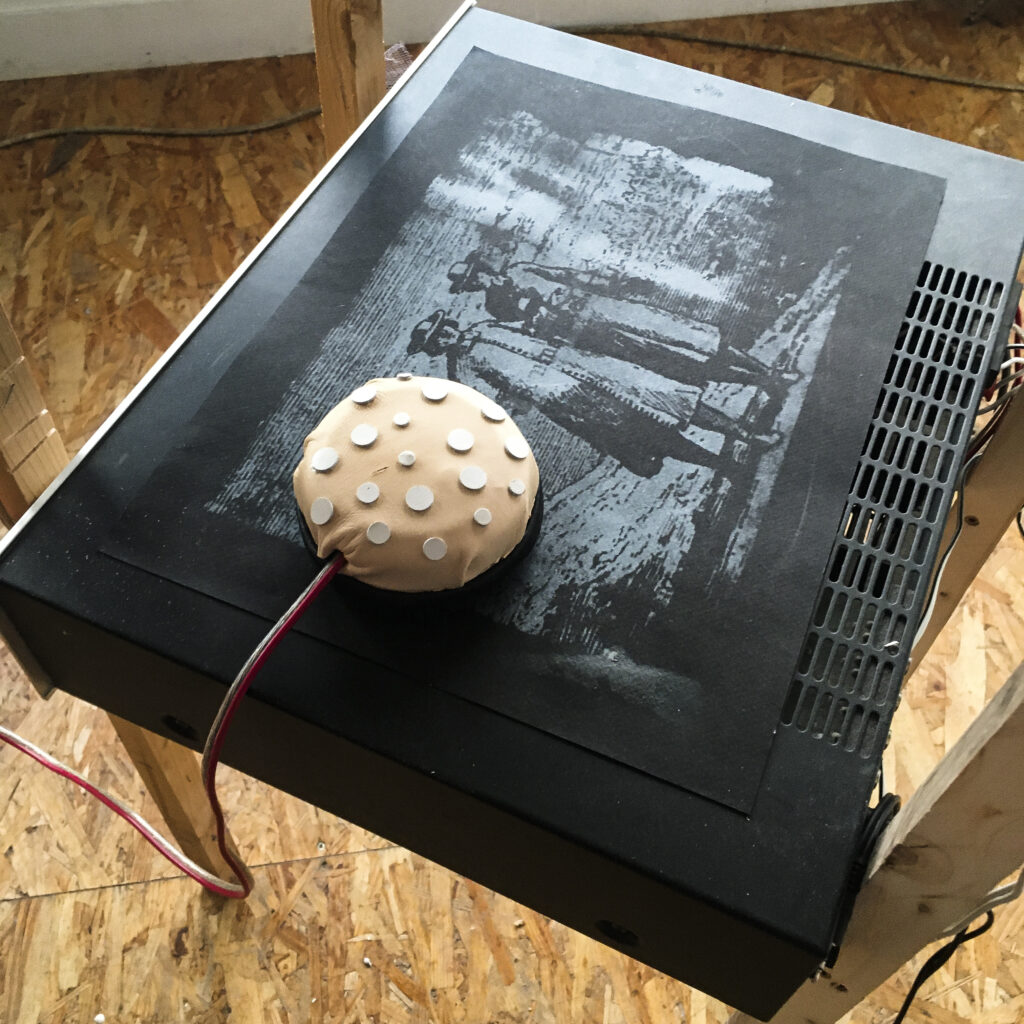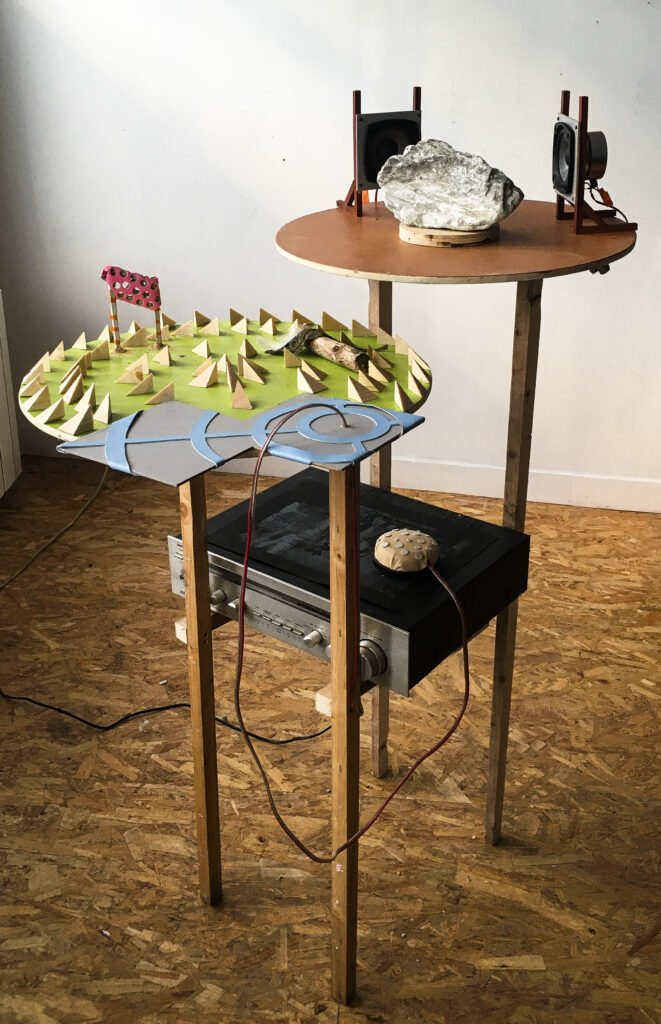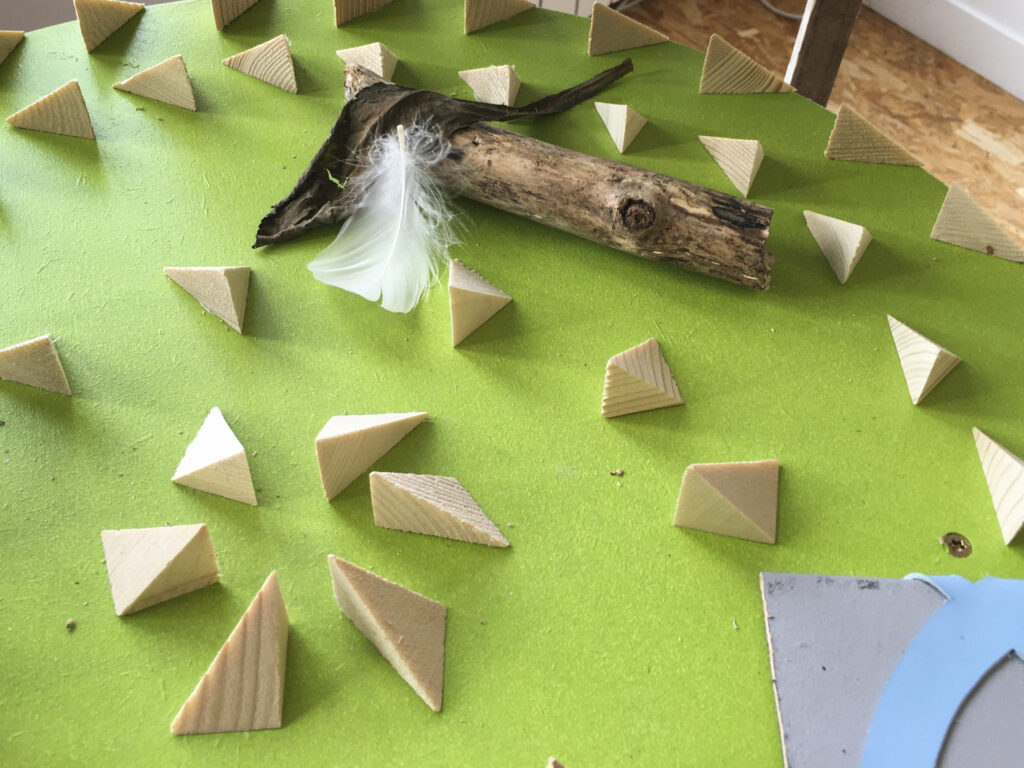The hidden secret of the masters, 2021
130 x 105 x 60 cm, 7’38, pierre, amplificateur, cuir, lecteur mp3, haut-parleurs, casque audio, medium, peinture acrylique, bois massif, feuille de pissenlit, plume de pigeon, contreplaqué.


The hidden secret of the masters presents a stone, enthroned on a pedestal, above
a landscape built with poor elements. The installation broadcasts a concrete music
symphony on speakers, addressed to the rock, while it is necessary to seize
a curious earpiece to hear the story told of it. I use snippets of intimate memories to
compose this first sound work: a parabolic text on pedagogy written at the Beaux-Arts de
Nantes in 2011, as well as objects gleaned and preserved. These are so many treasures
of a collection that I accumulate modestly, with time and the childish spirit that continues to animate me.
« Two masters wondered about the structure of the universe. One of them said that after man we would find nothing more convincing and more superb. The other assured that before man and after him, there was always and would be a quantity of cells, and therefore that man was not the ultimate factor, but rather that it was the particles elementary, of which man is only a conglomerate. The other, offended, retorted genius, logic. What about gray matter, he said as they passed by a forest and a lake. The second had the idea of the demonstration to prove to his friend the master that cells, even without intelligence, should always be placed at the top of the pyramid of living things. He took a stone and threw it into the pond. It sank into the opaque liquid, leaving in its wake a characteristic flop and a water wave. The first nodded.
The forest hid the storm and the storm veiled the firmament. Behind, there were the stars, themselves hidden by the intensity of the solar rays. The latter excited the tops of the clouds, invisible from below, since it was dark, in the rain, in the forest. There, there was a tree, at the edge of a meadow which sheltered a leaf. We couldn’t really distinguish it from the rest of the leaves, due to lack of observation, the birch leaf, like all the others in this birch monoculture. But this one would fall last, on the last day of winter, in an Olympic slide inspired by the breeze, on the pile that the other leaves would form, in the shape of a crescent moon, for the one who, in the middle of the clearing, would watch as he died, before pivoting and realizing that in fact a half-moon, it was a perfect circle that surrounded him. The individual would conceive it from above, in his mind the rain having stopped and a ray of light managing to pierce the forest.
In the pond, the stone was very alone and very wet. He thought of the cold brought by the emerging winter and of the warm rays that he would never see again, so deeply ensconced that he was in the depths of the abyss. He in no way accepted his position to assert, his stature as ultimate proof in the eyes of the masters, his role as a missing link in the chain of elementary particles, nor his acquired place, hidden from the eyes of common sense. How could you do it, stone, incapable of moving and reasoning with the masters? How could you untie your chains and see the emancipation of your race of geological allies, from the depths of your dark cell populated with aquatic residue? That destiny had not endowed you with less intermediate qualities, that had it not made you a salient flint on the path of the masters who seized you, with you the opportunity to tear the veil of global ignorance, and makes your virtues sink into the limbo of a lake. Remember the hope that once filled you, when from a tectonic block that had seen you grow, you were extracted to carve you into a keystone. Barely installed in the church when it fell under secular bombs. Barely a second in your miserable life. And you knew the sea whose features the wave left you before fate left you there, residing in your final home, you thought. So much so that the shade of the forest sometimes seemed conducive to you to rehash these inhospitable memories, because chance had made you find this warm corner. But then you were thrown into the water, and you suspected that never again would you disperse into grains due to the tide, nor would you have the opportunity to accumulate the heat of the sun and even less to keep a little warm around the lake when night falls. You will remain the buried secret of the masters.
However, a scientist was distilling his philosophy in front of a group of inattentive professors, in the room adjoining the room where animal bodies and other skeletons had been stored since a law or reform had condemned them to dust under lock and key. His knowledge beaded on his forehead and echoed in the corridor. He was outraged that his classes were taught so little about the exact sciences and was sorry for his students whose blackened notebooks were the only measure of ignorance. Where was the dry spirit of mathematics, where the geniuses of tomorrow who would lead the herd to solve infinitely small and explosive problems? Or ? He was talking about pedagogy, while the director passed by, turning his head when he found the solution. He had to provide his students with proof of the existence of the stone, or the stone itself that he had searched for so much. This answer weighed on him. »

« Deux maîtres s’interrogeaient sur la tenue de l’univers. L’un d’eux disait qu’après l’homme on ne trouverait rien de plus convainquant et de plus superbe. L’autre assurait qu’avant l’homme et après lui, il y eut toujours et il y aurait quantité de cellules, et donc que l’homme n’était pas l’ultime facteur, mais bien plutôt que c’étaient les particules élémentaires, dont l’homme n’est qu’un conglomérat. L’autre, offusqué, rétorquait le génie, la logique. Quid de la matière grise, disait-il alors qu’ils passaient aux abords d’une forêt et d’un lac. Le second eu l’idée de la démonstration pour prouver à son ami le maître que les cellules, même sans intelligence, devaient toujours être mises en haut de la pyramide des choses du vivant. Il prit une pierre et la jeta dans la marre. Elle coula dans le liquide opaque, laissant dans son sillage un flop caractéristique et une onde aquatique. Le premier acquiesça.
La forêt cachait l’orage et l’orage voilait le firmament. Derrière, il y avait les étoiles, elles-même cachées par l’intensité des rayons solaires. Ces derniers excitaient le dessus des nuages, invisibles du dessous, puisqu’il faisait noir, sous la pluie, dans la forêt. Là, il y avait un arbre, à l’orée d’une prairie qui abritait une feuille. On ne la distinguait pas vraiment du reste des feuilles, par manque d’observation, la feuille de bouleau, pareille à toutes les autres dans cette monoculture de bouleaux. Mais celle-ci tomberait la dernière, au dernier jour de l’hiver, dans une glissade olympique inspirée par la brise, sur le tas que formeraient les autres feuilles, en croissant de lune, pour celui qui, au milieu de la clairière, la regarderait mourir, avant de pivoter et de saisir qu’en fait de demi-lune, c’était un cercle parfait qui l’entourait. L’individu le concevrait du dessus, dans son esprit la pluie ayant cessé et un rayon de lumière parvenant à percer la forêt.
Dans la marre, le caillou s’était trouvé bien seul et bien humide. Il pensait au froid apporté par l’hiver naissant et aux rayons chaleureux qu’il ne reverrait plus, si profondément installé qu’il était dans les profondeurs de l’abîme. Il n’acceptait en rien sa position de faire valoir, sa stature de preuve ultime aux yeux des maîtres, son rôle de chaînon manquant dans la chaîne des particules élémentaires, ni sa place acquise, cachée aux yeux du sens commun. Comment pouvais-tu faire, caillou, incapable de te mouvoir et de raisonner les maîtres ? Comment pouvais-tu délier tes chaînes et voir l’émancipation de ta race d’alliés géologiques, du fond de ta cellule sombre et peuplée de résidus aquatiques ? Que le destin ne t’avait-il pas doté de qualités moins intermédiaires, que n’avait-il pas fait de toi un silex saillant sur la route des maîtres qui t’ont saisit, avec toi l’occasion de déchirer le voile de l’ignorance globale, et fait sombrer tes vertus dans les limbes d’un lac. Souviens toi l’espoir qui t’emplissait jadis, lorsque d’un bloc tectonique qui t’avait vu grandir, on t’avait extrait pour te tailler en pierre de voûte. A peine été installé dans l’église qu’elle tombait sous les bombes laïques. A peine une seconde dans ta vie misérable. Et tu connu la mer dont la vague te laissa les traits avant que le destin ne te laisse là, résidant de ton ultime demeure, pensais-tu. Si bien que l’ombre de la forêt te semblait parfois propice à ressasser ces souvenirs inhospitaliers, car le fait du hasard t’avait fait trouver ce coin chaud. Mais voilà qu’on te jetais à l’eau, et tu te doutais bien que jamais plus tu ne te disperserai en grains à force de marrée, ni n’aurait l’occasion d’accumuler la chaleur du soleil et encore moins de garder un peu chauds les abords du lac lorsque tomberait la nuit. Tu resterai le secret enfouis des maîtres.
Cependant, un scientifique distillait sa philosophie devant une bande de professeurs inattentifs, dans la pièce attenante à la salle ou les corps animaux et autres squelettes étaient entreposés depuis qu’une loi ou une réforme les avaient condamnés à la poussière sous clef. Son savoir perlait sur son front et résonnait dans le couloir. Il était révolté qu’on enseigne à ses classes si peu de choses fondamentales sur les sciences exactes et désolé par ses élèves dont les cahiers noircis marquaient la seule mesure de l’ignorance. Où était l’esprit aride des mathématiques, où les génies de demain qui mèneraient le troupeau à la résolution des problèmes infiniment petits et explosifs ? Où ? Il parlait de pédagogie, tandis que passait le directeur qui tournait la tête, lorsqu’il trouva la solution. Il fallait qu’il apporte à ses élèves la preuve de l’existence de la pierre, ou la pierre elle même qu’il avait tant cherché. Cette réponse lui pesa. »
